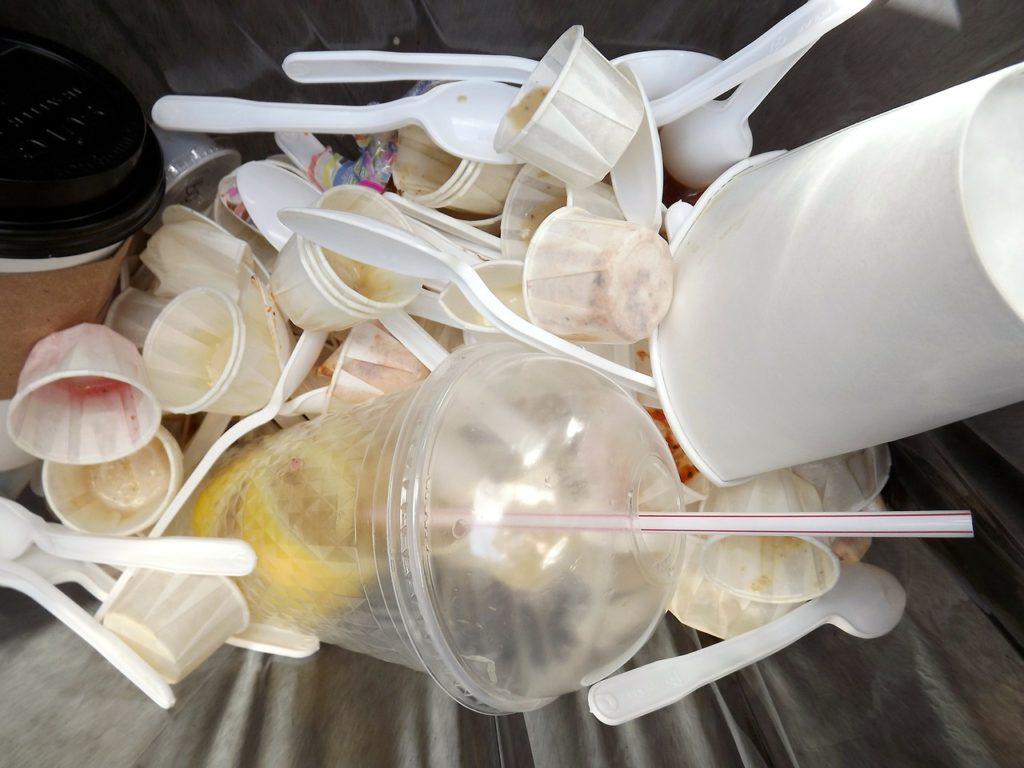Brussels could fine Cyprus for failing to adopt an EU directive into law for not banning single-use plastic items on time.
Cyprus is hampering the bloc’s 10-year war on single-use plastic items, says Cyprus Greens MP Charalambous Theopemptou, as the country is nowhere near adopting the relative legislation.
“Although the deadline is in July, we in parliament have not yet received the relevant bill to discuss and vote on, and it seems we will be late in implementing this environmental legislation,” Theopemptou told the Financial Mirror.
The ban applies to cotton bud sticks, cutlery, plates, straws, stirrers, and sticks for balloons.
It will also apply to cups, food and beverage containers made of expanded polystyrene, and all products made of oxo-degradable plastic.
The Green’s leader said without the government bill; the House cannot incorporate the EU directive banning single-use plastics into local legislation.
“From what we know, the competent ministry is working on a bill…Even if it comes in tomorrow, we will not have time to pass it by July,” said Theopemptou.
Given that parliament will in the next couple of weeks ahead of the May elections and the time needed for new committees to be set up, the earliest the issue could be discussed is mid-June.
It is expected the EU will start infringement procedures in July by first sending a letter to Cyprus asking for an update, followed by a reasoned letter, and then taking it to court, where Nicosia will receive a hefty fine.
Theopemptou argued that Cyprus has already failed its mission to implement the directive, as it will probably have to rush procedures to beat the infringement action.
He said that is what happened with the legislation restricting the use of plastic bags.
“We were forced to pass a law just days before Cyprus was to appear before an EU court for failing to implement the relative directive. The result? We passed a law with many loopholes.”
“This legislation is important because disposable plastics are what we find mainly thrown in nature. The EU has started a war on plastics over the next decade, and this is the first step.”
Sealife
Single-use plastic products (SUPs) are extremely harmful to the environment and human health as they are used for a short period before being thrown away.
“They are more likely to end up in seas than reusable options, finding their way back to our tables, this time in food.”
According to the EU, the 10 most commonly found single-use plastic items on European beaches, alongside fishing gear, represent 70% of all marine litter.
Banning single-use plastic items is not only good for the environment and human health but could also give a push to an economy struck down by the coronavirus outbreak.
Theopemptou believes banning disposable plastic could provide growth opportunities.
“This is one of the reasonings why Europe is pushing for a cyclical economy.”
“Companies producing or importing single-use plastics need to be given enough time to adjust or venture into new greener options.
“You can’t change things overnight and expect the markets to follow suit.”
Theopemptou said there are alternatives to single plastic use items.
“Companies importing plastic cotton buds could search the market to find cotton buds made from bamboo straw”.
He added that importers would need time to do their homework about what materials they could import and find materials that can either be recycled or biodegradable.
In a communication with the Financial Mirror, the Ministry of Agriculture and Environment said they are aware of the tight timeframe, the deadline to pass the legislation being July, and working to submit the bill as soon as possible.
The 10 items to be banned in the EU on 3 July and replaced by sustainable alternatives:
- Cotton bud sticks
- Cutlery, plates, straws, and stirrers
- Balloons and sticks for balloons
- Food containers
- Cups for beverages
- Beverage containers
- Cigarette filters
- Plastic bags
- Packets and wrappers
- Wet wipes and sanitary items










